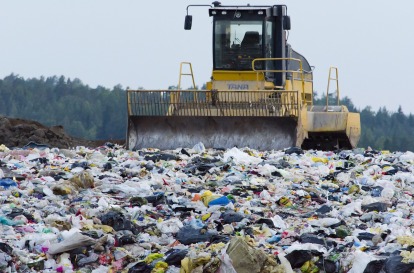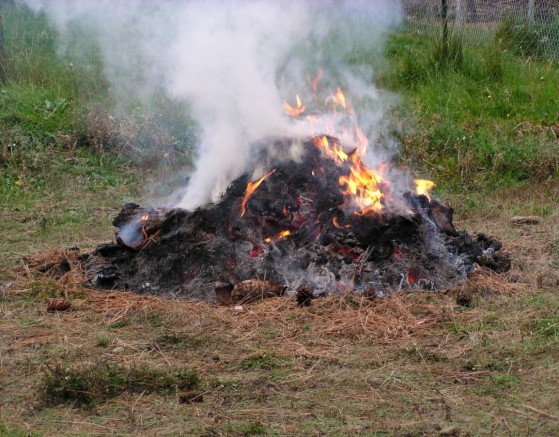Written by Nneka Joyce Odimba*, Edited by Amara Anyogu
How can we manage waste more efficiently? This question is not unique to local and state governments all over the world. As long as there has been life, there has been waste. The population of Nigeria is increasing, we are building cities and megacities. This will correlate with an increase in the waste we produce. How do we respond to the challenge of Sustainable Development Goal 11 of building Sustainable Cities and Communities? In this article, Joyce explains why composting can be a viable and more sustainable alternative for dealing with waste and the vital role of microorganisms in achieving this – AA.

We need more effective strategies for dealing with waste
Sights as pictured here are all too common in many major cities in Nigeria. Landfill sites are full of refuse generated from different parts of the country. The waste management system of many households relies on the use of incineration. Global urbanization as well as steady rise in human population has resulted in the generation of large quantities of waste.
In Nigeria, more than 32 million tons of solid wastes are generated annually. In Lagos State alone, more than 10,000 tons are generated each day. Of the annual generated waste accounted for, only approximately 20-30% is collected while the rest is disposed indiscriminately leading to blockage of drainage systems and the pollution of water bodies amongst other numerous environmental, health, social and economic challenges (1).

To overcome these concerns, effective management strategies for these wastes must be adopted. The non-regulated locating of landfills and unselective use of domestic incineration often result in devastating effects on human health, soil health and the atmosphere. These breeding of mosquitoes and rodents, deterioration of soil fertility leading to poor plant growth and more devastating effects such as the depletion of the ozone layer leading associated with acid rain as well as skin exposure to ultraviolet radiation linked to skin cancer in humans. Thus, the need to adopt effective means of waste management and conversion to value added products is of essence.
Why compost waste?
Composting can be described as a process that uses oxygen in the breaking down of decomposable waste products into humus-like end products. Among the various waste treatment options available, composting has gained wide popularity primarily because of the simplicity of the process. Composting does not require technical expertise and can be practiced at a household scale. Other associated benefits include making waste more hygienic, cost effectiveness and the conversion of waste to value-added products (2). Composting serves as a strategy to achieve the goals of ‘green’ chemistry in sustaining and protecting the environment.
Composting is a reliable waste treatment option that could be useful in reduction of some of the negative effects that may arise due to the direct application of organic waste to the soil. This is because it provides sanitized and stabilized products which could be utilized as potential source of organic fertilizers or as amendments to help improve plant growth and health (2). It also reduces the volume of organic substances.

Microbes and composting
Why are microbiologists interested in composting? Because microorganisms play a key role in the process. Composting can occur under natural or controlled conditions and involves the decomposition of organic matter to compost through microbial activities (4). Microorganisms such as Xanthomonas, Pseudomonas and Clostridium can convert waste to compost under suitable environmental conditions. These microorganisms have been isolated from compost and their ability to enhance the nitrogen content of compost has been reported in some scientific studies (5,6,7). Other organisms such as earthworms, millipedes etc are also involved in the composting process.
Due to the important role played by microorganisms in the composting process, different formulations of microorganisms are available commercially for e.g. Effective Microorganism (EM) and Microbial Activator Super LDD 1 (8). The microorganisms present in a compost heap varies according to the environmental conditions (temperature, pH, moisture) and the stage of the composting process (9). The presence of certain microorganisms can be used as a good indicator of the stage and quality of the maturing process (7, 9). Thermophilic Bacillus strains, capable of producing important biological compounds like cellulases and polyphenol oxidases have been isolated from compost materials (11). Cellulases are enzymes that break down complex carbohydrates into simpler sugars. Cellulose is a type of carbohydrate found in plants and is not easily degradable, cellulases can help products like sawdust and cassava chaff. Polyphenol oxidases can help to reduce browning of wine from grapes.
Benefits of composting and a note of caution
Composting is a widely used technology for transforming organic waste to organic manure in many parts of the world. This allows for the recycling of nutrients such as nitrogen, phosphorus and potassium that could be utilized for agricultural purposes (12). This makes compost a serious competitor in the fertilizer market (13). The high temperature conditions associated with composting helps to destroy potential disease-causing bacteria present in the waste (14). Compost can be used as a bioremediation option, because it acts as a stabilizer i.e. immobilizes metal in the soil and also as a ‘washing’ agent because it contains certain chemical compounds that can be used in the treatment of soil contaminated with heavy metals (15).
Nevertheless, the benefits of composting procedures can only be achieved if the process is effectively managed (16). Environmental conditions (aeration, moisture, temperature) must be kept optimal and there must be appropriate planning during composting if value-added products are to be obtained. This can only be informed by well conducted research studies.
Going forward…
The government has an important role to play in supporting composting in combination with the use of landfill and other forms of waste management. This can be achieved by setting up programs and initiatives charged with providing loans and grants for composting facilities. This will ensure the sustainability of composting and will in turn create job opportunities for local communities.
Another way the government can support composting is by encouraging organic farming; creating a favourable market to promote the use of composts over traditional soil amendments and soil fertilizers. Policy makers can also support, empower and collaborate with the various research institutions in the country to enable them to develop inexpensive pretreatment processes, for recalcitrant substrates (materials with complex make up such as chicken feathers). For example, genetically modified strains could be used as microbial inoculum to hasten the transformation of organic matter and increase the efficiency of the composting process.
Furthermore, environmental scientists should engage and educate the public on more sustainable methods of waste management informed by their research output.
About the author: Nneka J. Odimba* is an Msc student in Environmental Microbiology at the University of Nigeria, Nsukka. Her research interests focus on the bioconversion of waste and pollution control. Nneka also serves as the Communications Officer of the Nigerian Applied Microbiologists network.